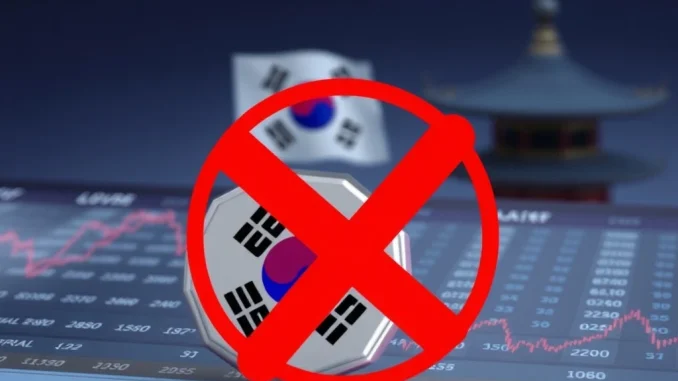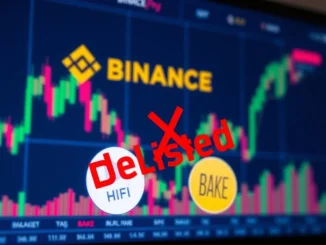
Urgent Warning: Bithumb Delists LeverFi (LEVER) Token on August 18
The cryptocurrency market is a dynamic landscape, and staying informed about exchange decisions is crucial for every investor. A recent announcement from Bithumb, one of South Korea’s leading crypto exchanges, has sent ripples through the community: the platform will delist LeverFi (LEVER). This move, scheduled for August 18, 2024, at 06:00 UTC, serves as an urgent reminder of the rigorous standards exchanges uphold and the potential consequences for projects that fail to meet them.
Why Bithumb Delists LeverFi: A Closer Look
Bithumb’s decision to delist LeverFi was not made lightly. The exchange stated on its official website that the move came after the project’s submitted materials failed to adequately address concerns that had previously placed LEVER on its ‘closely monitored assets’ list. This designation is a critical warning sign, indicating that a project is under scrutiny for various reasons, which can include:
- Lack of Viability: Questions regarding the project’s long-term sustainability or its ability to deliver on its roadmap.
- Insufficient Disclosure: Failure to provide transparent and timely information about project developments, finances, or team changes.
- Market Concerns: Issues related to trading volume, liquidity, or potential market manipulation.
- Regulatory Compliance: Non-adherence to evolving legal and regulatory frameworks.
Following an in-depth evaluation of LeverFi’s disclosures, overall viability, and sustainability, Bithumb determined that the token no longer met its stringent listing requirements. This rigorous process underscores Bithumb’s commitment to maintaining a secure and reliable trading environment for its users.
Understanding the LeverFi Delisting Process
For current holders of LEVER crypto, understanding the implications of this delisting is paramount. When an exchange delists a token, it typically means:
- Cessation of Trading: After the specified date (August 18, 06:00 UTC), trading pairs involving LEVER on Bithumb will be removed, and users will no longer be able to buy or sell the token on the platform.
- Withdrawal Period: Exchanges usually provide a grace period during which users can withdraw their delisted tokens to an external wallet or another exchange that supports LEVER. It is crucial for users to check Bithumb’s official announcement for the exact withdrawal deadline. Failure to withdraw tokens before this deadline could result in permanent loss.
- Liquidity Impact: Delistings, especially from major exchanges like Bithumb, can significantly impact a token’s liquidity and price. With fewer avenues for trading, the token’s market depth may decrease, potentially leading to increased volatility or difficulty in selling at a desired price.
Users holding LEVER on Bithumb should prioritize reviewing the exchange’s official notice and planning their next steps promptly.
Broader Crypto Exchange News: A Trend of Scrutiny
This incident is part of a larger trend in the cryptocurrency space where exchanges are becoming more proactive in managing their listed assets. Major platforms globally are increasing their scrutiny, leading to more frequent delistings. This isn’t just about a project’s performance; it’s also about the evolving regulatory landscape and the need for exchanges to protect their reputation and user base. Common reasons for delistings across the industry include:
- Low Trading Volume: Tokens that don’t generate sufficient trading activity are often removed to free up resources.
- Lack of Development: Projects that show no ongoing development or updates are deemed stagnant.
- Security Concerns: Vulnerabilities in the project’s smart contracts or network.
- Regulatory Pressure: Tokens that fall foul of new or existing regulations in specific jurisdictions.
- Ethical Concerns: Projects involved in scams, rug pulls, or other illicit activities.
These actions, while sometimes inconvenient for holders, are ultimately aimed at fostering a healthier and more trustworthy ecosystem. They encourage projects to maintain high standards and ensure investor confidence.
The Landscape of South Korean Crypto Regulation
South Korea has long been a significant player in the global crypto market, known for its active trading community and, more recently, its robust regulatory framework. The country’s financial authorities have been particularly keen on implementing strict measures to protect investors and prevent illicit activities. This includes:
- Real-Name Trading Accounts: Mandating the use of real-name accounts for crypto transactions to enhance transparency.
- Anti-Money Laundering (AML) Compliance: Strict AML guidelines for exchanges.
- Investor Protection Laws: Ongoing efforts to establish comprehensive laws that govern virtual asset service providers (VASPs) and protect users from market manipulation and fraud.
In this environment, exchanges like Bithumb operate under considerable pressure to ensure every listed asset complies with both internal standards and national regulations. The delisting of LEVERFi is a testament to this stringent oversight, highlighting the importance of continuous compliance and project development in a highly regulated market.
Actionable Insights for Crypto Investors
The Bithumb delisting of LeverFi serves as a potent reminder for all crypto investors:
- Stay Informed: Regularly check official announcements from exchanges where you hold assets and from the projects themselves.
- Diversify Your Portfolio: Avoid putting all your capital into a single token, especially those that may be newer or have lower market capitalization.
- Understand Project Fundamentals: Before investing, research a project’s whitepaper, team, technology, community engagement, and development roadmap.
- Don’t Leave Assets on Exchanges Long-Term: For long-term holdings, consider moving your tokens to a secure hardware wallet where you control your private keys. Exchanges are for trading, not for long-term storage.
- Act Promptly on Delisting Notices: If a token you hold is delisted, immediately review the exchange’s instructions for withdrawals or alternative solutions.
A Compelling Summary
Bithumb’s decision to delist LeverFi (LEVER) by August 18, 2024, is a significant event for the project and its holders. It underscores the critical importance of project viability, transparency, and continuous adherence to exchange listing requirements. For investors, this serves as a powerful reminder to conduct thorough due diligence, stay abreast of exchange announcements, and manage their portfolios proactively to mitigate risks in the ever-evolving cryptocurrency landscape. The incident highlights that even established exchanges are not hesitant to take decisive action to maintain the integrity and security of their platforms, reinforcing the need for vigilance in this dynamic market.
Related News
- Binance Alpha Unlocks Exciting Opportunity with KITE Crypto Listing
- Bitcoin Everlight's Developer Progress Shines Amidst Market Volatility and 'Will Bitcoin Crash?' Questions
- Aptos Blockchain Unveils Strategic Archax Partnership for Revolutionary Real-World Asset Tokenization
Related: Bitcoin Stalls Below $70K as Institutional Demand Falters, Wintermute Analysis Reveals
Related: Strategic: Bitget and Arkis Forge Partnership to Revolutionize Institutional Crypto Trading
Related: Strategic Move: Smarter Web Secures $30M Coinbase Credit Line to Accelerate Bitcoin Treasury Buys



